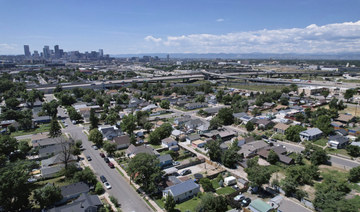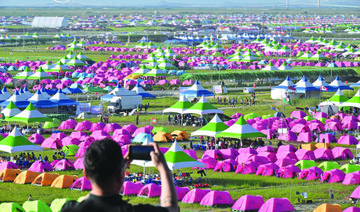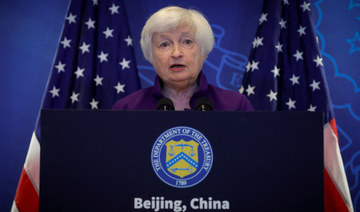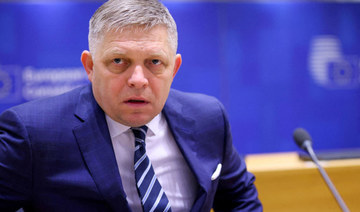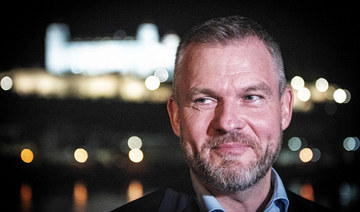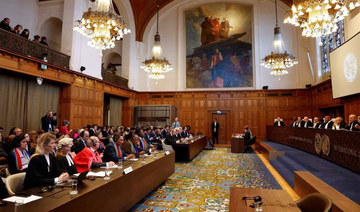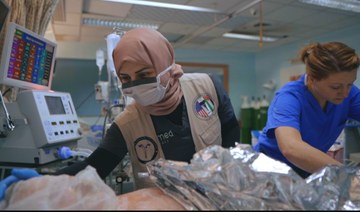AUSTIN, Texas: Temperatures have soared in the central US, leading to deaths in some states as more dangerous heat is expected, a national weather service official said Wednesday.
The harsh heat wave has broken records, damaged roads and water lines, and forced the evacuation of a nursing home this week as some cities brace for triple digit temperatures through August. There have been 25 heat-related deaths this summer in Louisiana, officials said Tuesday, and in Nebraska, a 1-year-old left in a hot van died.
The heat is expected to become “dangerous to the average person” if they don’t have air conditioning, said Alex Lamers, warning coordination meteorologist at the National Weather Service’s Weather Prediction Center.
It has felt hotter than 110 degrees in cities in Texas and Louisiana more often than at any time since World War II, Lamers said. The brunt of the enduring heat has hit states from Florida to New Mexico, he said.
The Electric Reliability Council of Texas asked residents twice last week to conserve energy because of high demand and low reserves. The agency issued a weather watch from Wednesday to Aug. 27.
The council hasn’t had an outage all summer despite unrelenting heat and high demand, said Alison Silverstein, a Texas-based independent energy analyst and former adviser to the state’s energy regulator.
But there are risks the longer this drags on, Silverstein said, comparing it to a car overheating.
“At least your car on a long trip has a chance to rest overnight and cool off,” she said. “A lot of these plants have been running nonstop, or pretty close to it, since June.”
Experts warn infrastructure like roads can buckle under the extreme strain of enduring and recurring heat waves brought on by climate change. Union Pacific has imposed more speed restrictions this summer across its network of more than 32,000 miles (51,499 kilometers) of Western track as a “precaution to reduce the impact on the rail when it gets hot,” spokeswoman Kristen South said Tuesday.
Costs in the US for road maintenance and replacement due to rising temperatures could reach $26.3 billion by 2040, with most of the damage expected to hit Texas, California and Illinois, according to a 2017 study by University of Arizona and Arizona State University researchers.
The heat has already caused an unusual number of Texas water line breaks and roadway issues.
Texas officials are monitoring the heat, roadways and tips from residents to address issues as quickly as possible, said transportation department spokesman Danny Perez. Houston officials learned of likely heat-related damage to a road Sunday after about 10 other similar reports in June, he said.
Houston’s high temperatures and a lack of rain have caused the ground to shift and damage the city’s aging pipes. Residents’ top service request is for water leaks, according to city data. Reports of water leaks from the past month were up 25 percent from the same period last year.
Demand and leaks are both increasing, and the city is using emergency purchase orders to add contractors for repairs, said Erin Jones, Houston Public Works spokeswoman.
San Antonio Water Systems has already tallied more breaks this month than in all of July, said the agency Wednesday. Customers need to cut back on outdoor watering, the agency said.
Cooling systems are also under strain. Missouri firefighters helped remove 117 patients from a Kansas City nursing facility Tuesday after the air conditioning failed in temperatures that felt as high as 115 degrees (46.1 C). Most Parkview Healthcare nursing facility residents were taken to other facilities, but seven who had COVID-19 were taken to hospitals, authorities said.
At least 20 complaints have been made against the facility in the past five years, since August 2018, according to the Missouri Department of Health and Senior Services.
Denise Oates, whose mother lives at the facility, told television station WDAF that it was upsetting to learn through social media that the air conditioning failed. She called and couldn’t get any answers about what was happening, Oates said.
“I’m just like, ‘Call me and let me know before you move her. I need to know where she moves to,’” Oates said.
The facility and owner, Cor Healthcare Partners based in Baltimore, did not immediately respond to requests for comment.
Not everywhere has been feeling the heat. In North Dakota, the city of Dickinson set a record of 60 degrees (15.6 C) for Aug. 20, beating the benchmark of 62 in 1974. On the same day, Bismarck tied its record of 62, set in 1966. The temperatures on Sunday were due to
An unseasonably cool air mass, clouds and rain helped bring temperatures down Sunday, but warmer temperatures are forecast in the coming days, said Corey King, an emergency response specialist with the National Weather Service in Bismarck.
Deadly heat wave in the central US strains infrastructure, transportation
https://arab.news/nvbkt
Deadly heat wave in the central US strains infrastructure, transportation

- Experts warn infrastructure like roads can buckle under the extreme strain of enduring and recurring heat waves brought on by climate change
What will be the repercussions of Biden’s new China tariffs?

- Biden’s move “may accelerate pressure on the EU to adopt a similarly strong posture in its own China tariff review," say analysts
- Beijing has warned it would “take resolute measures” to defend its interests
WASHINGTON: US President Joe Biden unveiled steep tariff hikes on Chinese green tech this week, hitting imports like electric vehicles, chips and solar cells — and adding stress to US-China ties.
But despite targeting $18 billion in imports across new and already targeted sectors, analysts do not expect a major economic impact, assuming Beijing does not retaliate significantly.
So what will be the repercussions of his moves?
Biden’s EV, semiconductor and battery tariffs “will not have a noticeable impact on US inflation or GDP,” said economist Ryan Sweet at Oxford Economics.
There were already levies on Chinese EVs, causing automakers to avoid the US market — though the new increase takes the tariff level from 25 percent to 100 percent.
“Last year, China exported around $400 million in battery EVs to the US while the European Union exported nearly $7.5 billion to the US,” Sweet said.
Oxford’s model assumes China does not retaliate significantly, given the current weaknesses seen in the world’s second largest economy, he said.
Tianlei Huang, research fellow at the Peterson Institute for International Economics, believes tariffs could hurt some Chinese companies’ sales and profitability.
But “the direct impact of those tariff hikes is actually quite limited,” he told a virtual event. “It’s more of a signal.”
More restrictive trade policies can cause low-carbon technologies to be less competitive against rivals like combustion engine vehicles, according to research from the Center for Strategic and International Studies (CSIS).
But research scenarios found that “rising trade frictions didn’t overcome the still-falling costs of clean energy,” said Joseph Majkut, director of the energy security and climate change program at the think tank.
US policies like the Inflation Reduction Act, which puts funding toward supporting the green transition, will still support the creation of domestic content too, he added.
China warns of retalization
Beijing has warned it would “take resolute measures” to defend its interests.
Policymakers could target industries in US swing states to impact Biden’s election chances, or opt for a symbolic retaliation, the Trivium China policy analysis group said in a newsletter.
China’s response, or lack thereof, will be telling in terms of how officials plan to address acts they deem as “economic suppression” moving forward, Trivium added.
“The challenge for the Chinese is, how do they do it in a way that doesn’t freak out foreign businesses?” said Bill Bishop, who publishes the Sinocism newsletter.
With Beijing previously announcing export controls on two rare metals essential for the manufacture of semiconductors, action on critical minerals remains possible, he said.
Beijing-based economist Mei Xinyu expects the response to be targeted, and analysts generally do not expect tit-for-tat actions.
China does not import American EVs while “Beijing and Shanghai have been very supportive of the one major US EV player, Tesla, in the China market,” said Paul Triolo, partner for China at Albright Stonebridge Group.
European tariffs
Biden’s move “may accelerate pressure on the EU to adopt a similarly strong posture in its own China tariff review, which is forthcoming,” said CSIS senior fellow Emily Benson.
The European Union launched an inquiry into Chinese electric car subsidies last year, fearing a threat to Europe’s auto industry. This could culminate in a tariff hike from the current 10 percent.
For now, the leaders of Germany and Sweden have expressed reservations about new European tariffs on Chinese EVs.
But if multiple major developed economies are on board with a tariff approach, China will likely be concerned from both an economic and propaganda standpoint, Bishop told AFP.
US tariffs may also “force Brussels’ hand” as it could divert trade to Europe, said Atlantic Council senior fellow Joseph Webster in an analysis.
“Brussels will have to act quickly, either to put its own tariffs in place or to accept a flood of Chinese-made products,” Webster added.
Analysts said the latest tariffs probably didn’t come as a surprise to China, given the signals from US officials ahead of the announcement.
But Bishop noted that the underlying problems between Washington and Beijing run deep — and that while both sides are talking again, their behaviors do not appear to have changed.
“These new actions just chip away at that very, very thin facade of stability,” he said.
Slovak PM shooting suspect named as 71-year-old writer; aides say Fico now out of danger

- The assassination attempt happened while Fico visited the central Slovak town of Handlova
- Slovak media say the suspect is the founder of the DUHA (Rainbow) Literary Club and was from the town of Levice
- The attack comes as political campaigning heats up three weeks ahead of Europe-wide elections to choose lawmakers for the European Parliament
BRATISLAVA: A suspect detained for shooting Slovakia Prime Minister Robert Fico is a 71-year-old writer from the center of the European nation, the interior minister said Wednesday, after media identified the man.
“I think I can confirm this, yes,” Interior Minister Matus Sutaj Estok told reporters when asked about reports identifying the man detained at the scene of the shooting in the town of Handlova.
A grey haired suspect was seen being handcuffed on the ground just after Fico was shot several times after a government meeting in Handlova.
The populist prime minister was shot multiple times and gravely wounded Wednesday, but his deputy prime minister said he believed Fico would survive.
The prime minister had been greeting supporters at an event when the attempted assassination took place, shocking the small country and reverberating across Europe weeks before an election.
“I guess in the end he will survive,” Tomas Taraba told the BBC, adding: “He’s not in a life threatening situation at this moment.”
Doctors fought for Fico’s life several hours after the pro-Russian leader, 59, was hit in the abdomen, Defense Minister Robert Kalina told reporters at the hospital where Fico was being treated.”
Five shots were fired outside a cultural center in the town of Handlova, nearly 140 kilometers (85 miles) northeast of the capital, government officials said. Fico was shot while attending a meeting of his government in the town of 16,000 that was once a center of coal mining.
A suspect was in custody, and an initial investigation found “a clear political motivation” behind the assassination attempt, Interior Minister Matus Sutaj Estok said as he briefed reporters alongside the defense minister.
Media reports said the suspect was a founder of the DUHA (Rainbow) Literary Club and was from the town of Levice.
The reports, which also named him, said he has written three poetry collections and is a member of the official Association of Slovak Writers.
The association confirmed on Facebook that the man had been a member since 2015, adding that if his identity as the suspected shooter was confirmed “the membership of this despicable person will be immediately canceled.”
The suspect’s son told Slovak news site aktuality.sk that he had “absolutely no idea what father was thinking, what he was planning, why it happened.”
He said his father was a legally registered gun owner.
When asked if he felt any hatred toward Fico, the son said: “I’ll tell you this: he didn’t vote for him. That’s all I can say about it.”
Vlasta Kollarova, head of a local library in the man’s hometown told Dennik N daily: “He was rebellious when he was young, but not aggressive.”
Several political statements by the man, who AFP has chosen not to name, could be found on social media.
“The world is full of violence and weapons. People seem to be going crazy,” he said in a video eight years ago posted online.
In the video, he also spoke about concern over immigration and “hatred and extremism” and said European governments “have no alternative to this chaos.”
He also said in the video that he had founded a “Movement Against Violence” in Levice.
The movement, which also has its Facebook page, defines itself as “an emerging political party whose goal is to prevent the spread of violence in society. To prevent war in Europe and the spread of hatred.”
Divisive figure
Fico has long been a divisive figure in Slovakia and beyond, but his return to power last year on a pro-Russian, anti-American message led to even greater worries among fellow European Union members that he would lead his country further from the Western mainstream.
Kicking off his fourth term as prime minister, his government halted arms deliveries to Ukraine, and critics worry that he will lead Slovakia — a nation of 5.4 million that belongs to NATO — to abandon its pro-Western course and follow in the footsteps of Hungary under populist Prime Minister Viktor Orbán.
Thousands have repeatedly rallied in the capital and across Slovakia to protest Fico’s policies.
A message posted to Fico’s Facebook account said he was taken to a hospital in Banská Bystrica, 29 kilometers (17 miles) from Handlova, because it would take too long to get to the capital, Bratislava.
The attack comes as political campaigning heats up three weeks ahead of Europe-wide elections to choose lawmakers for the European Parliament. Concern is mounting that populist and nationalists similar to Fico could make gains in the 27-member bloc.
But politics as usual were put aside as the nation faced the shock of the attempt on Fico’s life.
“A physical attack on the prime minister is, first of all, an attack on a person, but it is also an attack on democracy,” outgoing President Zuzana Caputova, a political rival of Fico, said in a televised statement. “Any violence is unacceptable. The hateful rhetoric we’ve been witnessing in society leads to hateful actions. Please, let’s stop it.”
President-elect Peter Pellegrini, an ally of Fico, called the shooting “an unprecedented threat to Slovak democracy. If we express other political opinions with pistols in squares, and not in polling stations, we are jeopardizing everything that we have built together over 31 years of Slovak sovereignty.”
The recent elections that brought Fico and his allies to power have underlined deep social divisions, exacerbated by the war in Ukraine, Slovakia’s neighbor to the east.
Gábor Czímer, a political journalist at Slovakian news outlet Ujszo.com, said Fico’s return to power had uncovered signs that “Slovak society is strongly split into two camps” — one that is friendly toward Russia and another that pushes for stronger connections with the EU and the West.
“At the same time, I couldn’t imagine that it would lead to physical violence,” Czímer said.
Estok, the Slovak interior minister, told reporters outside the hospital that the country was “on the edge of a civil war” from the political tension.
“Such hateful comments are being made on social networks today, so please, let’s stop this immediately,” he said.
US President Joe Biden said he was alarmed by the assassination attempt. “We condemn this horrific act of violence,” he said in a statement.
NATO Secretary-General Jens Stoltenberg posted on the social media platform X that he was “shocked and appalled” by the attempt on Fico’s life. European Commission President Ursula von der Leyen called it a “vile attack.”
Ukrainian President Volodymyr Zelensky denounced the violence against a neighboring country’s head of government.
“Every effort should be made to ensure that violence does not become the norm in any country, form or sphere,” he said.
Slovakia’s Parliament was adjourned until further notice. The major opposition parties, Progressive Slovakia and Freedom and Solidarity, canceled a planned protest against a controversial government plan to overhaul public broadcasting that they say would give the government full control of public radio and television.
Progressive Slovakia leader Michal Simecka called on all politicians “to refrain from any expressions and steps which could contribute to further increasing the tension.”
Czech Prime Minister Petr Fiala wished the premier a swift recovery. “We cannot tolerate violence, there’s no place for it in society.”
The Czech Republic and Slovakia formed Czechoslovakia until 1992.
Putin arrives in China for state visit in a show of unity between the authoritarian allies

- On the eve of the visit, Putin told Chinese media that the Kremlin is prepared to negotiate over the conflict in Ukraine
- Ukrainian president has said any negotiations must include a restoration of Ukraine’s territorial integrity and withdrawal of Russian troops
BEIJING: Russia’s President Vladimir Putin landed Thursday in Beijing for a two-day state visit to China, in a show of unity between the authoritarian allies as Moscow presses forward with a new offensive in Ukraine.
Putin’s visit comes as Russia has become more economically dependent on China following Moscow’s full-scale invasion of Ukraine more than two years ago.
On the eve of the visit, Putin said in an interview with Chinese media that the Kremlin is prepared to negotiate over the conflict in Ukraine. “We are open to a dialogue on Ukraine, but such negotiations must take into account the interests of all countries involved in the conflict, including ours,” Putin was quoted as saying by the official Xinhua News Agency.
The Russian leader’s two-day trip comes as his country’s forces have pressed an offensive in northeastern Ukraine’s Kharkiv region that began last week in the most significant border incursion since the full-scale invasion began, forcing almost 8,000 people to flee their homes.
Along with Moscow’s efforts to build on its gains in the nearby Donetsk region, the 2-year-old war has entered a critical stage for Ukraine’s depleted military that is awaiting new supplies of anti-aircraft missiles and artillery shells from the United States.
“We have never refused to negotiate,” Putin was quoted as saying by Xinhua. “We are seeking a comprehensive, sustainable and just settlement of this conflict through peaceful means. We are open to a dialogue on Ukraine, but such negotiations must take into account the interests of all countries involved in the conflict, including ours.”
Ukrainian President Volodymyr Zelensky has said any negotiations must include a restoration of Ukraine’s territorial integrity, the withdrawal of Russian troops, the release of all prisoners, a tribunal for those responsible for the aggression, and security guarantees for Ukraine.
China claims to take a neutral position in the conflict, but has backed Moscow’s contentions that Russia was provoked into attacking Ukraine by the West, despite Putin’s public avowals of his desire to restore Russia’s century-old borders as the reason for his assault.
Putin has blamed the West for the failure of negotiations in the opening weeks of the war and praised China’s peace plan for Ukraine that would allow Moscow to cement its territorial gains.
“Beijing proposes practicable and constructive steps to achieve peace by refraining from pursuing vested interests and constant escalation of tensions, minimizing the negative impact of the conflict on the global economy,” he had said.
Putin said a Chinese proposal in 2023, which Ukraine and the West rejected, could “lay the groundwork for a political and diplomatic process that would take into account Russia’s security concerns and contribute to achieving a long-term and sustainable peace.”
The Kremlin said in a statement that during their talks this week, Putin and Chinese leader Xi Jinping will “have a detailed discussion on the entire range of issues related to the comprehensive partnership and strategic cooperation and determine the new directions for further development of cooperation between Russia and China and also have a detailed exchange of opinions on the most acute international and regional issues.”
The visit furthers the effort by China and Russia to topple the US-led Western democratic order in favor of a more authoritarian model that crushes political opposition, human rights and freedom of speech. Putin began a fifth term in office this month.
Speaking Tuesday in the upper house of Russian parliament, Foreign Minister Sergey Lavrov said Moscow and Beijing are “objectively interested in maintaining our lead in efforts to establish a more fair and democratic world order.”
“Russia and China aren’t alone in their efforts to reform an international system and help establish a multipolar global order,” he said.
Lavrov noted that the “duet of Moscow and Beijing plays a major balancing role in global affairs,” adding that “the Russian president’s forthcoming visit to (China) will strengthen our joint work.”
Moscow has forged increasingly close ties with Beijing as the war has dragged into a third year, diverting the bulk of its energy exports to China and relying on Chinese companies for importing high-tech components for Russian military industries to circumvent Western sanctions.
The Russia-China military ties have also strengthened. They have held a series of joint war games in recent years, including naval drills and patrols by long-range bombers over the Sea of Japan and the East China Sea. Russian and Chinese ground forces also have deployed to the other country’s territory for joint drills.
China remains a major market for Russian military, while also massively expanding its domestic defensive industries, including building aircraft carriers and nuclear submarines.
Putin has previously said that Russia has been sharing highly sensitive military technologies with China that helped significantly bolster its defense capability. In October 2019, he mentioned that Russia was helping China to develop an early warning system to spot ballistic missile launches — a system involving ground-based radar and satellites that only Russia and the US possessed.
South Africa seeks halt to Israel’s Rafah offensive at World Court

- The hearings on May 16 and 17 will only focus on issuing emergency measures, to keep the dispute from escalating
THE HAGUE: South Africa will ask the top UN court on Thursday to order a halt to the Rafah offensive as part of its case in The Hague accusing Israel of genocide in the Gaza Strip.
The hearings at the International Court of Justice, also known as the World Court, come after South Africa last week asked for additional emergency measures to protect Rafah, a southern Gaza city where more than a million Palestinians have been sheltering.
It also asked the court to order Israel to allow unimpeded access to Gaza for UN officials, organizations providing humanitarian aid, and journalists and investigators. It added that Israel has so far ignored and violated earlier court orders.
On Thursday, South Africa will present its latest intervention seeking emergency measures starting at 3 p.m.(1300 GMT).
Israel, which has denounced South Africa’s claim that it is violating the 1949 Genocide Convention as baseless, will respond on Friday. In previous filings it stressed it had stepped up efforts to get humanitarian aid into Gaza as the ICJ had ordered.
Gilad Erdan, Israel’s ambassador to the United Nations told Army Radio on Wednesday the short notice the court gave for the hearings did not allow sufficient legal preparation, adding that was “a telling sign.”
The Israel-Hamas war has killed nearly 35,000 people in Gaza, according to health authorities there. About 1,200 people were killed in Israel and 253 taken hostage on Oct. 7 when Hamas launched the attack that started the war, according Israeli tallies.
South Africa accuses Israel of acts of genocide against Palestinians. In January, the court ordered Israel to ensure its troops commit no genocidal acts against Palestinians in Gaza, allow in more humanitarian aid and preserve any evidence of violations.
The hearings on May 16 and 17 will only focus on issuing emergency measures, to keep the dispute from escalating. It will likely take years before the court can rule on the merits of the case.
The ICJ’s rulings and orders are binding and without appeal. While the court has no way to enforce them, an order against a country could hurt its international reputation and set legal precedent.
India says it is working to repatriate UN staffer killed in Gaza

- Waibhav Anil Kale, who was working with the UN Department of Safety and Security, and was killed while heading to the European Hospital in Rafah along with a colleague, who was wounded in the incident
NEW DELHI: India said on Wednesday it was working to repatriate the body of a former Indian Army officer serving as a UN staffer, who was killed in Gaza when his vehicle was hit by what the UN said was tank fire in Rafah where only Israeli tanks are present.
The staffer, Waibhav Anil Kale, was working with the UN Department of Safety and Security and was heading to the European Hospital in Rafah along with a colleague, who was wounded in the incident. The UN said he was the first international UN staffer killed in Gaza since the war began on Oct. 7, taking the total UN death toll to 191.
UN Secretary General’s deputy spokesperson Farhan Haq said on Tuesday the UN had set up a fact-finding panel to determine the responsibility for Kale’s death.
“It’s very early in the investigation, and details of the incident are still being verified with the Israeli Defense Force,” he told a press cconference. Asked by reporters about the shots fired on the vehicle, he said, “we believe it came from a tank in the area” and later added, it was “safe” to assume that only the IDF tanks in that region. There are 71 international UN staff members in Gaza currently, he said. The IDF said in a statement on Monday that the incident was “under review” and the IDF had not been made aware of the vehicle’s route. But an initial inquiry indicated that “the vehicle was hit in an area declared an active combat zone.”
The Hamas-run government’s media office accused Israel of “deliberately targeting foreign staff in the Gaza Strip.”
India’s Foreign Ministry said its diplomatic missions were “in touch with relevant authorities” on the investigation into Kale’s death, and helping to bring home his body.
In a statement on Monday after Kale’s death, UN Secretary General Antonio Guterres reiterated an “urgent appeal for an immediate humanitarian ceasefire and for the release of all hostages,” saying the conflict in Gaza was continuing to take a heavy toll “not only on civilians, but also on humanitarian workers.” He has demanded explanations for all their deaths.



